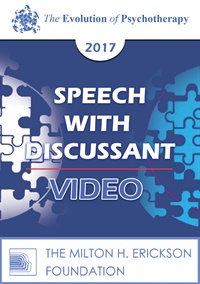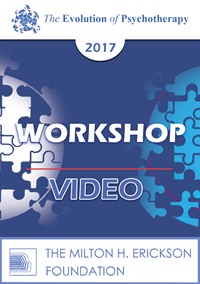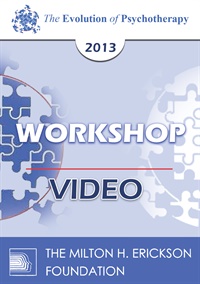- Average Rating:
- Not yet rated
- Topic Areas:
- Keynotes | Therapeutic Relationship | Therapist Development | Couples Therapy
- Categories:
- Couples Conference | Couples Conference 2022 | Pioneers in Couples and Family Therapy
- Faculty:
- William Doherty, PhD
- Course Levels:
- Master Degree or Higher in Health-Related Field
- Duration:
- 57:40
- Format:
- Audio and Video
- Original Program Date:
- Jun 24, 2022
- Short Description:
- In this golden age for models of couples therapy, therapists may wonder if they should be practicing the “one best model.” The research is clear that couples therapy models that have been tested are about equally effective, and that there are a number of key ingredients in any effective way to practice couples therapy. The presenter will describe these key ingredients that cut across models and some skills necessary to practice any model. He will argue that since this therapy is about improving relationships, the relationships we establish with our couple clients—balanced, caring, and sometimes challenging—are the heart of what we have to do well.
- Price:
- $59.00 - Base Price
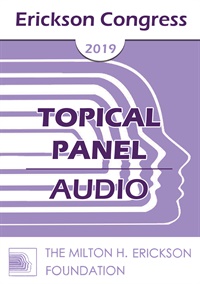
- Average Rating:
- Not yet rated
- Topic Areas:
- Workshops | Ericksonian Hypnosis and Therapy Techniques | Hypnotherapy | Group Therapy
- Categories:
- Erickson Congress | Erickson Congress 2019
- Faculty:
- Jorge Abia, MD
- Duration:
- 2 Hours
- Format:
- Audio Only
- Original Program Date:
- Dec 13, 2019
- Short Description:
- This workshop presents a large-scale, evidence-based model for using Ericksonian hypnotherapy in disaster settings and acute crises. Drawing on work with more than four thousand survivors, the presenters show how trance, metaphor and automatic drawing help stabilize emotion, restore agency and prevent post-traumatic stress. Participants learn the neuropsychophysiology behind these methods and see how structured hypnotic protocols can support self-care, resilience and rapid recovery in individuals and large groups alike.
- Price:
- $15.00 - Base Price
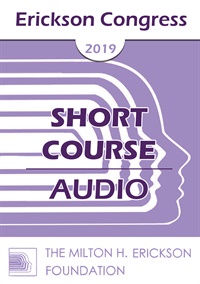
- Average Rating:
- Not yet rated
- Topic Areas:
- Short Courses | Pain and Healing | Tailoring | Trauma
- Categories:
- Erickson Congress | Erickson Congress 2019
- Faculty:
- James Keyes, PhD
- Duration:
- 1 Hour 32 Minutes
- Format:
- Audio Only
- Original Program Date:
- Dec 12, 2019
- Short Description:
- During this presentation, the development of chronic pain syndromes and some practical interventions will be discussed. Specifically, assessing patient's current functioning within a "whole-person approach" will allow clinicians better information about where to begin assisting with change. While using the "evidence-based treatments" as a starting point, finding ways to tailor the intervention to the individual will be reviewed. We will honor the long-history of hypnosis being used to treat chronic pain. Finally, we will review outcome research indicating what seems to make the most effect for patients with pain.
- Price:
- $15.00 - Base Price
Credit available - Click Here for more information
- Average Rating:
- Not yet rated
- Topic Areas:
- Speeches with Discussants | Psychotherapy | Future Oriented
- Categories:
- Evolution of Psychotherapy | Evolution of Psychotherapy 2017 | Online Continuing Education
- Faculty:
- Steven Hayes, PhD | David Burns, MD
- Course Levels:
- Master Degree or Higher in Health-Related Field
- Duration:
- 1:26:46
- Format:
- Audio and Video
- Original Program Date:
- Dec 16, 2017
- Short Description:
- Evidence-based care is still the future of mental and behavioral health intervention, but not in the form of protocols for syndromes which has finally collapsed of its own weight. This talk is about what is arising in its place. I argue that process-based therapy is the logical next step in the evolution of evidence-based care: evidence-based processes linked to evidence-based procedures that alleviate the problems and promote the prosperity of people. Using the work on psychological flexibility as a foil, I explore how process-based therapy can help dissolve some of the long standing differences between the various wings of psychotherapy, and liberate the practices of practitioners who value an evidence-based approach.
- Price:
-
Sale is $29.00
price reduced from Base Price - $59.00
Credit available - Click Here for more information
- Average Rating:
- Not yet rated
- Topic Areas:
- Workshops | Couples Therapy | Family Therapy | Psychotherapy
- Bundle(s):
- Learning Track - Couples Starter Kit
- Categories:
- Evolution of Psychotherapy | Evolution of Psychotherapy 2017 | Online Continuing Education
- Faculty:
- John Gottman, PhD | Julie Gottman, PhD | Bill Bumberry, PhD
- Course Levels:
- Master Degree or Higher in Health-Related Field
- Duration:
- 2:36:31
- Format:
- Audio and Video
- Original Program Date:
- Dec 14, 2017
- Short Description:
- This workshop traces the evolution of couples and family therapy from early systems theory to a data-driven science of relationships. Drawing on decades of research from the Love Lab, it introduces concrete markers of relationship stability, including the 5:1 positive-to-negative ratio, physiological regulation, and repair attempts. Through clinical examples and outcome data, the session translates research into practical interventions for conflict, trust, commitment, domestic violence, and the transition to parenthood, offering a hopeful and rigorously tested model for lasting connection.
- Price:
-
Sale is $29.00
price reduced from Base Price - $59.00
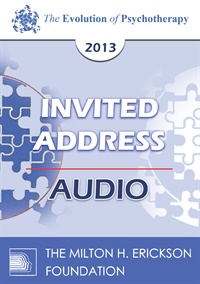
- Average Rating:
- Not yet rated
- Topic Areas:
- Invited Addresses | Psychotherapy | Research
- Categories:
- Evolution of Psychotherapy | Evolution of Psychotherapy 2013
- Faculty:
- David Barlow, PhD
- Duration:
- 58:07
- Format:
- Audio Only
- Original Program Date:
- Dec 14, 2013
- Short Description:
- Dr. Barlow reflects on the evolution of evidence-based psychotherapy and the challenges of translating research into everyday clinical care. The session examines what decades of outcome research reveal about psychological treatments, why effective therapies often remain underused, and how policy, training, and delivery systems shape what clients actually receive. Participants are encouraged to think beyond therapy “schools” toward principle-driven, transdiagnostic approaches and broader public-health models for expanding access to effective care.
- Price:
- $15.00 - Base Price
- Average Rating:
- Not yet rated
- Topic Areas:
- Psychotherapy | Topical Panels | Research
- Categories:
- Evolution of Psychotherapy | Evolution of Psychotherapy 2013
- Faculty:
- David Barlow, PhD | Steven Hayes, PhD | Scott Miller, PhD
- Course Levels:
- Master Degree or Higher in Health-Related Field
- Duration:
- 59:47
- Format:
- Audio and Video
- Original Program Date:
- Dec 14, 2013
- Short Description:
- This panel explores where psychotherapy research is headed as the field moves beyond rigid treatment packages toward understanding what actually drives change. Participants engage with questions about process-based evidence, therapist effects, client engagement, and how flexibility, values, and deliberate practice shape outcomes across approaches. The discussion offers a grounded, sometimes provocative look at how research can better support real clinical decision-making without losing sight of complexity, context, and the therapist’s role in the room.
- Price:
-
Sale is $29.00
price reduced from Base Price - $59.00
- Average Rating:
- Not yet rated
- Topic Areas:
- Workshops | Anger | Children and Adolescent Therapy | Psychotherapy
- Categories:
- Evolution of Psychotherapy 2013 | Evolution of Psychotherapy
- Faculty:
- Donald Meichenbaum, PhD
- Course Levels:
- Master Degree or Higher in Health-Related Field
- Duration:
- 1:13:44
- Format:
- Audio and Video
- Original Program Date:
- Dec 12, 2013
- Short Description:
- How do you “make” a violent individual, and what are the implications for both prevention and treatment, using a life-span perspective? This workshop will demonstrate how to use evidence-based interventions with angry and aggressive children, adolescents and adults. A major focus will be on ways to bolster generalization and maintenance of treatment effects.
- Price:
-
Sale is $29.00
price reduced from Base Price - $29.00
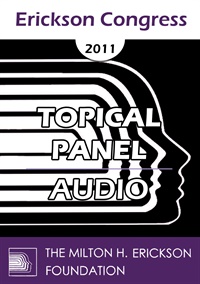
- Average Rating:
- Not yet rated
- Topic Areas:
- Topical Panels | Therapist Development | Therapy Practice
- Categories:
- Erickson Congress | Erickson Congress 2011
- Faculty:
- Steve Andreas, MA, NLP | Wendel Ray, PhD | Scott Miller, PhD | Michael Munion, MA, LPC
- Duration:
- 59 Minutes
- Format:
- Audio Only
- Original Program Date:
- Dec 07, 2011
- Short Description:
- This topical panel looks closely at outcome-focused practice and what it actually means to know whether therapy is helping. Through debate, clinical stories, and research-informed perspectives, the discussion explores goal clarity, client feedback, measurement, and accountability, while questioning how therapists can stay responsive, ethical, and effective in real-world settings where expectations and pressures keep shifting.
- Price:
- $20.00 - Base Price
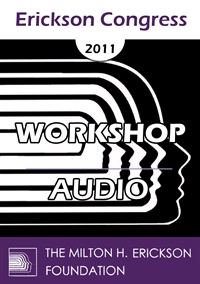
- Average Rating:
- Not yet rated
- Topic Areas:
- Workshops | Therapist Development
- Categories:
- Erickson Congress | Erickson Congress 2011
- Faculty:
- Scott Miller, PhD
- Duration:
- 59 Minutes
- Format:
- Audio Only
- Original Program Date:
- Dec 07, 2011
- Short Description:
- Thanks to a number of recent studies, there is now solid empirical evidence for what distinguishes highly effective from average therapists. In this workshop, participants will learn three specific strategies that separate the great from the good. Participants will also learn a simple method for measuring success rates that can be used to develop a profile of their most and least effective moments in therapy—what works and what doesn’t. Not only will attendees get a far more exact idea of their clinical strengths and weaknesses and how to use the findings to improve their own practice, but they will also come away with the concrete tools that will immediately boost clinical abilities and effectiveness.
- Price:
- $20.00 - Base Price
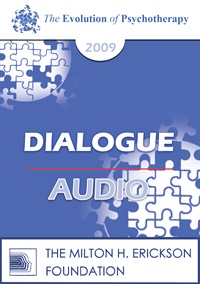
- Average Rating:
- Not yet rated
- Topic Areas:
- Psychology | Dialogues | Positive Psychology | Psychotherapy
- Categories:
- Evolution of Psychotherapy | Evolution of Psychotherapy 2009
- Faculty:
- David Barlow, PhD | Martin Seligman, PhD
- Duration:
- 1 Hour
- Format:
- Audio Only
- Original Program Date:
- Dec 12, 2009
- Short Description:
- This dialogue brings together two senior figures in psychotherapy to examine how evidence-based practice and positive psychology converge, and where they challenge each other. The session explores the limits of symptom-reduction models, the role of resilience, meaning, and strengths, and how therapy might move beyond treating pathology alone. Participants hear a candid, wide-ranging exchange on what counts as evidence, how science shapes clinical practice, and what it means to help people not just suffer less, but live better.
- Price:
- $15.00 - Base Price

- Average Rating:
- Not yet rated
- Topic Areas:
- Dialogues | Psychotherapy
- Categories:
- Evolution of Psychotherapy | Evolution of Psychotherapy 2009
- Faculty:
- Donald Meichenbaum, PhD | Scott Miller, PhD
- Duration:
- 1 Hour 7 Minutes
- Format:
- Audio Only
- Original Program Date:
- Dec 11, 2009
- Short Description:
- EP09 Dialogue 09 – Evidenced-Based Practice – Donald Meichenbaum, PhD and Scott Miller, PhD Educational Objective: Given a topic, to describe the differing approaches to psychotherapy, and to identify the strengths and weaknesses of each approach.
- Price:
- $15.00 - Base Price
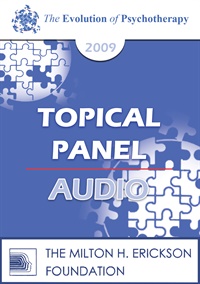
- Average Rating:
- Not yet rated
- Topic Areas:
- Psychotherapy | Topical Panels | Research
- Categories:
- Evolution of Psychotherapy | Evolution of Psychotherapy 2009
- Faculty:
- David Barlow, PhD | Steven Hayes, PhD | Scott Miller, PhD
- Duration:
- 1 Hour 2 Minutes
- Format:
- Audio Only
- Original Program Date:
- Dec 11, 2009
- Short Description:
- This panel takes a candid look at what psychotherapy research actually tells us about change, outcomes, and effectiveness. The discussion challenges diagnosis-driven models, questions whether specific techniques outperform others, and explores the roles of therapeutic alliance, client strengths, and trans-diagnostic processes. Participants are invited to rethink how therapy works, how progress should be measured, and what research means for real-world clinical practice and training.
- Price:
- $15.00 - Base Price
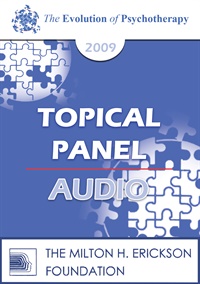
- Average Rating:
- Not yet rated
- Topic Areas:
- Post-Traumatic Stress Disorder (PTSD) | Topical Panels | Psychotherapy
- Categories:
- Evolution of Psychotherapy | Evolution of Psychotherapy 2009
- Faculty:
- Albert Bandura | Marsha Linehan, PhD | Donald Meichenbaum, PhD
- Duration:
- 1 Hour 3 Minutes
- Format:
- Audio Only
- Original Program Date:
- Dec 11, 2009
- Short Description:
- This panel takes a wide, unscripted look at post-traumatic disorders through the lenses of resilience, recovery, and real-world treatment challenges. Drawing on research, clinical experience, and work with survivors of war, assault, and disaster, the conversation explores self-efficacy, exposure, moral injury, shame, social support, and why most people recover while some do not. Rather than promoting a single method, the session wrestles with what actually helps, what can make things worse, and how therapists can think more integratively about trauma, ethics, and care.
- Price:
- $15.00 - Base Price
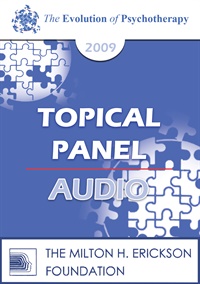
- Average Rating:
- Not yet rated
- Topic Areas:
- Couples Therapy | Topical Panels | Psychotherapy | Communication
- Categories:
- Evolution of Psychotherapy | Evolution of Psychotherapy 2009 | Pioneers in Couples and Family Therapy
- Faculty:
- John Gottman, PhD | Julie Gottman, PhD | Michele Weiner-Davis, LCSW | Harville Hendrix, PhD
- Duration:
- 1 Hour
- Format:
- Audio Only
- Original Program Date:
- Dec 11, 2009
- Short Description:
- Leading voices in couples therapy explore diverse, evidence-informed approaches. The Gottmans draw from decades of research to explain the Sound Relationship House and how couples build intimacy through small, daily moments. Hendrix outlines the value of structured dialogue in healing relational wounds. Weiner-Davis highlights the power of action-based interventions that build skills and restore hope. Together, the panelists reflect on shared clinical values—like adaptability, warmth, and curiosity—and how these principles can guide therapists working with conflict, trauma, and differences in sexual desire.
- Price:
- $15.00 - Base Price
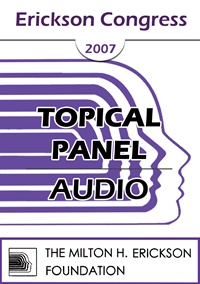
- Average Rating:
- Not yet rated
- Topic Areas:
- Topical Panels | Depression | Hypnosis | Psychotherapy
- Categories:
- Erickson Congress | Erickson Congress 2007
- Faculty:
- Jorge Abia, MD | Sofia Bauer | Claude Virot, MD | Michael Yapko, PhD
- Duration:
- 57:58
- Format:
- Audio Only
- Original Program Date:
- Dec 08, 2007
- Short Description:
- This panel brings together international clinicians to explore depression through biological, psychological and social lenses while examining how hypnosis and psychotherapy can complement or extend medication. Participants hear practical perspectives on behavioral activation, cognitive style, cultural factors, relapse prevention and the role of anxiety as a precursor to depression. The discussion offers clear, usable ideas for blending psychoeducation, hypnotic skills and strategic intervention to help clients build hope, movement and long-term resilience.
- Price:
- $15.00 - Base Price
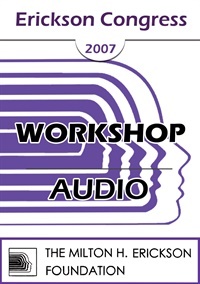
- Average Rating:
- Not yet rated
- Topic Areas:
- Workshops | Ericksonian Hypnosis and Therapy Techniques | Hypnotherapy | Post-Traumatic Stress Disorder (PTSD)
- Categories:
- Erickson Congress | Erickson Congress 2007
- Faculty:
- Jorge Abia, MD
- Duration:
- 1:21:24
- Format:
- Audio Only
- Original Program Date:
- Dec 07, 2007
- Short Description:
- An Ericksonian, research-informed approach to working with PTSD, acute stress and chronic stress as a broad spectrum of conditions. Participants learn how neurobiology, crisis patterns and unresolved life events shape stress responses, and how hypnosis can interrupt the feedback loops that sustain anxiety, hyperarousal and emotional overload. The training demonstrates practical techniques such as modulated catharsis, emotional analgesia and ego-state rescue, offering a structured yet flexible protocol that helps clients regain regulation, reduce symptoms and restore adaptive coping.
- Price:
- $15.00 - Base Price
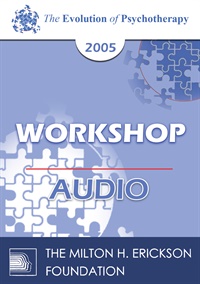
- Average Rating:
- Not yet rated
- Topic Areas:
- Topical Panels | Therapist Development | Training
- Categories:
- Evolution of Psychotherapy | Evolution of Psychotherapy 2005 | Pioneers in Couples and Family Therapy
- Faculty:
- Harville Hendrix, PhD | Arnold Lazarus, Ph.D. | Cloe Madanes, HDL, LIC | Scott Miller, PhD
- Duration:
- 59 Minutes
- Format:
- Audio Only
- Original Program Date:
- Dec 10, 2005
- Short Description:
- This panel explores therapist training, balancing theory with real-world practice. Hendrix emphasizes internalizing theory and using rituals; Lazarus favors evidence-based methods over excessive theory. Madanes supports training non-professionals with a systemic lens, while Miller advocates outcome-based feedback, noting traditional training doesn't always improve results. The panel agrees on the value of flexible, client-centered approaches backed by continuous evaluation. Moderated by Michael Munion, MA
- Price:
- $15.00 - Base Price
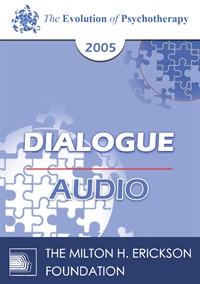
- Average Rating:
- Not yet rated
- Topic Areas:
- Dialogues | Psychotherapy
- Categories:
- Evolution of Psychotherapy | Evolution of Psychotherapy 2005
- Faculty:
- Nicholas Cummings, PhD | Scott Miller, PhD
- Duration:
- 55 Minutes
- Format:
- Audio Only
- Original Program Date:
- Dec 09, 2005
- Short Description:
- Dialogue 05 from the Evolution of Psychotherapy 2005 - Evidence-Based Practice Featuring Nicholas Cummings, PhD, and Scott Miller, PhD Moderated by Jeffrey Kottler, PhD
- Price:
- $15.00 - Base Price
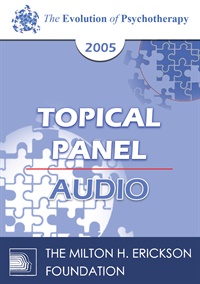
- Average Rating:
- Not yet rated
- Topic Areas:
- Topical Panels | Interviewing | Psychotherapy | Therapist Development
- Categories:
- Evolution of Psychotherapy | Evolution of Psychotherapy 2005
- Faculty:
- David Barlow, PhD | John Gottman, PhD | Julie Gottman, PhD | Bessel van der Kolk, MD
- Duration:
- 1 Hour 1 Minutes
- Format:
- Audio Only
- Original Program Date:
- Dec 09, 2005
- Short Description:
- This panel examines the initial interview as a critical moment for assessment, alliance-building, and clinical observation across individual, couples, and trauma-focused work. Drawing from anxiety research, couples science, and trauma theory, the session explores how clinicians listen, observe affect and physiology, assess safety and strengths, and decide what not to pursue too quickly. Participants gain practical insight into using structured interviews flexibly, reading nonverbal cues, and creating early conditions for trust, regulation, and meaningful change. Moderated by Stephen Lankton, MSW
- Price:
- $15.00 - Base Price
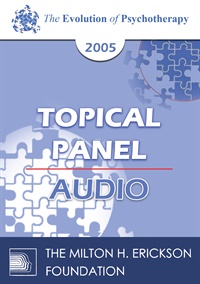
- Average Rating:
- Not yet rated
- Topic Areas:
- Topical Panels | Art and Creativity | Psychotherapy
- Categories:
- Evolution of Psychotherapy | Evolution of Psychotherapy 2005
- Faculty:
- David Barlow, PhD | Scott Miller, PhD | Erving Polster, PhD | Daniel Siegel, MD
- Duration:
- 1 Hour 5 Minutes
- Format:
- Audio Only
- Original Program Date:
- Dec 09, 2005
- Short Description:
- This panel takes on the enduring question of whether psychotherapy is an art, a science, or something that resists that split altogether. Drawing from anxiety research, outcome studies, Gestalt therapy, and interpersonal neurobiology, the session explores evidence-based practice, therapist effectiveness, subjective experience, and how change actually happens in the consulting room. Participants are invited into a lively, nuanced discussion of technique versus relationship, measurement versus meaning, and how science can inform clinical intuition without flattening it. The result is a thoughtful look at what helps therapy work, and why no single lens is sufficient on its own. Moderated by Daniel Eckstein, PhD
- Price:
- $15.00 - Base Price
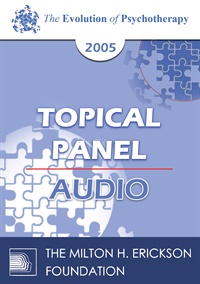
- Average Rating:
- Not yet rated
- Topic Areas:
- Topical Panels | Psychotherapy | Research
- Categories:
- Evolution of Psychotherapy | Evolution of Psychotherapy 2005
- Faculty:
- Albert Bandura | Marsha Linehan, PhD | Donald Meichenbaum, PhD | John Gottman, PhD
- Duration:
- 1 Hour 2 Minutes
- Format:
- Audio Only
- Original Program Date:
- Dec 09, 2005
- Short Description:
- This panel takes an candid look at psychotherapy research, asking not just what works, but how change actually holds up in real life. Drawing on couples research, suicide prevention, treatment development, and implementation science, the discussion wrestles with relapse, mechanisms of change, evidence-based practice, and the gap between research settings and everyday clinical work. Therapists and students are invited into a lively, unscripted conversation about data, judgment, ethics, and how research can genuinely serve both clients and society. Moderated by Jeffrey Kottler, PhD
- Price:
- $15.00 - Base Price

- Average Rating:
- Not yet rated
- Topic Areas:
- Short Courses | Brief Therapy | Cancer | Meditation, Spirituality and Yoga
- Categories:
- Erickson Congress | Erickson Congress 2004
- Faculty:
- Martin Rossman, MD
- Duration:
- 1:19:45
- Format:
- Audio Only
- Original Program Date:
- Dec 02, 2004
- Short Description:
- The diagnosis of cancer brings with it a host of psychological as well as physical challenges. Interactive imagery can help patients restore their sense of control when their coping abilities are both most needed and most challenged. In this presentation we will review at least four evidence-based techniques that can help restore a patient's coping and decision-making abilities, stimulate their immunity and help them reduce the adverse effects of surgery, chemotherapy and other cancer treatments.
- Price:
- $15.00 - Base Price

- Average Rating:
- Not yet rated
- Topic Areas:
- Topical Panels | Art and Creativity | Psychotherapy | Brief Therapy | Neuroscience
- Categories:
- Brief Therapy Conference | Brief Therapy Conference 2002
- Faculty:
- Steve Andreas, MA, NLP | Albert Ellis, PhD | Scott Miller, PhD
- Duration:
- 58:57
- Format:
- Audio Only
- Original Program Date:
- Dec 13, 2002
- Short Description:
- This topical panel tackles the long-running question of whether psychotherapy is best understood as an art, a science, or something closer to belief and persuasion. Through lively debate and contrasting viewpoints, it explores evidence, technique, therapist influence, and client change, offering a candid look at why different approaches often work, even when their theories sharply disagree.
- Price:
- $15.00 - Base Price
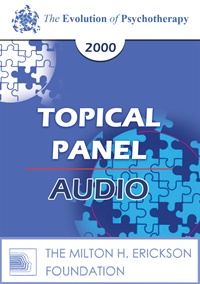
- Average Rating:
- Not yet rated
- Topic Areas:
- Topical Panels | Psychotherapy | Research
- Categories:
- Evolution of Psychotherapy | Evolution of Psychotherapy 2000
- Faculty:
- Albert Bandura | Aaron Beck, MD | Eugene Gendlin, PhD | Donald Meichenbaum, PhD
- Duration:
- 55 Minutes
- Format:
- Audio Only
- Original Program Date:
- May 27, 2000
- Short Description:
- This panel takes a candid, practical look at what psychotherapy research can and cannot tell us about change. Moving beyond simple outcome claims, the discussion examines how treatments work, what actually predicts improvement, and why process, alliance, context, and social impact matter alongside symptom reduction. The conversation challenges therapists to think more critically about evidence, ethics, prevention, and real-world effectiveness, especially with complex, high-risk, and underserved populations
- Price:
- $15.00 - Base Price



